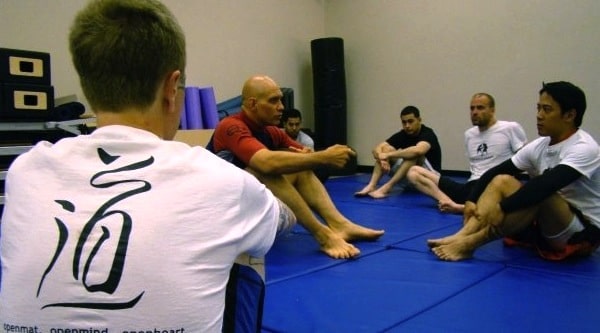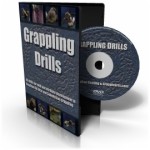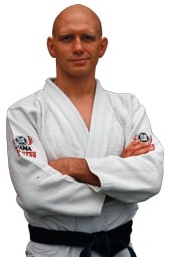
I often get questions from BJJ and submission grappling practitioners about whether they can benefit from doing additional drills at home. Often the people asking these questions are either extremely time-constrained and can’t make it to the class as often as they would like. Or they are just very serious students of the art and want to improve as fast as humanly possible.
My answer is that there ARE a lot of solo movement drills in BJJ. And yes, drilling can sometimes be very, very helpful. But depending on what your goals are, there might actually be other things you can do to improve faster.
As someone who actually sells an instructional DVD about grappling drills on this site it feels a little strange to say this, but drilling may NOT always be the best use of your time…
Whether you should drill really comes down to what you’re hoping to achieve with your drilling.
The two main reasons you might want to do some additional solo training at home are:
- Conditioning. You get tired too easily when you’re actually rolling with people, and you’re hoping that extra drilling may want to improve your sports-specific strength and endurance, or
- Technique and sports-specific movement. You might be having difficulties with certain movements and transitions on the ground, and are hoping that home drilling might make you smoother and faster.
Here’s the brutal truth: home drilling is really best suited for the second area – the development of movement.
If it is conditioning that is holding you back then you’re better served by going for a run or hitting the gym. Yes, of course it’s true that you can do movement drills to exhaustion. Most movement drills will slowly improve your conditioning if you do them long enough and hard enough.
But time is precious. In fact time is the ultimate non-renewable resource, so I’m all about being targeted and efficient in my training.
If your main goal is to get stronger, or to improve your endurance, then do workouts that are specifically designed to improve those attributes. There are a million different ways to exercise, and so long as you find something that is both challenging and enjoyable then there will be direct carry-over to your performance on the mat.
When time is limited pick exercise modalities that are quick, efficient, and challenge your whole body. Choose Tabata sprints over jogging for 10 km. Go with squats, bench presses, deadlifts and pullups rather than trying to isolate the lateral head of the triceps with your dumbell kickbacks bodybuilder-style. Unless, of course, you really like long runs or bodybuilding, in which case fill your boots and do whatever you are most likely to stick with in the long run.
To get you started with choosing conditioning workouts, here’s a link to the many articles on conditioning and specific workouts that I’ve published on Grapplearts over the years.
OK, so hopefully I’ve talked you out of drilling at home if your only goal is to improve your conditioning…
The other reason you might want to drill is to improve your technique and the quality of your movement. And this IS an area where doing even small amounts of additional drilling can really help.
Regardless of whether you’re drilling on your own time, or if they’re done at the beginning of a formal class, drills are a very effective way to internalize the signature movements of the grappling arts. Movements like shrimping, Granby rolls, technical stand ups, and penetration steps need tons of repetition to become smooth and instinctive, and drilling is all about getting maximum repetition in minimum time. There are even solo drills that will help you with submissions, guard retention, sprawling, and pin escapes.
Drilling is obviously great for physical repetition, but it also usually means that you’re becoming more thoughtful in how you approach your grappling. By thinking about the correct way to move your hips, transfer your weight, roll over your shoulder, etc. your game will continue to improve even when you’re not in class. Too many grapplers simply try to do stuff on the mat without ever analysing why they’re doing it, or what the best way to do it is. Drilling helps keep these questions front of mind, which is an important part of getting to the conscious competence stage of your skill development.
When it comes to home drilling, a little goes a long way. Pick a couple of drills, do them for 5 to 10 minutes several times a week, and you’ll start seeing results soon.
Now, a word of warning…
A standard theme in Kung Fu movies is when the hero goes off on his own to train. Usually this involves a bamboo-filled grove and tons and tons of pre-rehearsed forms (katas).
I wish this were true, but BJJ isn’t Kung Fu, and you really do need time with training partners to get better. I think it was one of the Machados who said, “no sparring, no miracles.” And that’s exactly correct.
Yes, it’s true that extra drilling can speed up your development, but at some point you need to take what those techniques and movements, bring them back to the mats, and field test it all against a real, live training partner (here are some of my top tips for dealing with a situation when training partners are hard to find).
So value your time, pick your drills carefully, do them diligently, and then see how it all works out when you’re training and sparring.
Best of luck with your training!
Stephan Kesting
 P.S. If you’re looking for some good solo and partner drills to do then one place to start is my Grappling Drills DVD. We produced it a few years ago so it’s not high definition video, but the information in this instructional disk is still 100% applicable and useful.
P.S. If you’re looking for some good solo and partner drills to do then one place to start is my Grappling Drills DVD. We produced it a few years ago so it’s not high definition video, but the information in this instructional disk is still 100% applicable and useful.


